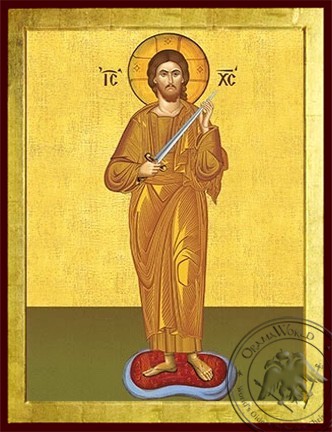THE TWO SWORDS
The relationship between the sacerdotal and regal is fundamental to the state of a civilization. In the Middle Ages, this relationship was discussed and developed using the expression the two swords:
The relationship between the sacerdotal and regal is fundamental to the state of a civilization. In the Middle Ages, this relationship was discussed and developed using the expression the two swords:
The expression is drawn from Luke 22:36-38, shortly before Jesus& #39;s arrest in the garden of Gethsemane, in which he tells the apostles to sell their cloaks and buy swords. When he is presented with two swords, he says that that is enough.
The Two Swords are AUCTORITAS - spiritual authority - and POTESTAS - temporal power. The first belongs to the "brahmans", the priests, those whose office is metaphysical realization. The latter belongs to the "kshatriya", the kings, lords, etc.
The relationship between the two swords is clearly defined in the different traditions. The brahmans convey a chrism and intellectual guarantee upon the kshatriyas; the kshatriyas create and maintain the conditions favourable to the work of the brahmans.
Thus in Hindu mythology, Skanda, the son of Shiva and lord of war, protects the meditation of Shiva’s other son, Ganehs, lord of knowledge.
The Greek-Buddhist statue of Heracles guarding Buddha meditating under the Bodhi tree has the same meaning: Heracles, the type of emperors, kings, etc. safeguards the realization of the highest and fundamental vocation:
Thomas Aquinas developed the same doctrine: according to him, all human functions, actions, etc. are subordinated to contemplation as a higher end… the government of civil life has as its real raison d’etre the securing of the peace of this contemplation.
A kshatriya expresses it thus: "I destroy my enemies and lead my inferiors with the aid of the spiritual power."
In order to exercise temporal power, certain kinds of knowledge are needed; knowledge in itself, the supreme knowledge, is not. See my thread on Guenon& #39;s metaphysics: https://twitter.com/ormulus/status/1449075110862671872?s=20">https://twitter.com/ormulus/s...
The superiority of knowledge over action owes to the fact that the former is the driver of the latter: action is submitted to the vicissitudes of change, contingency, transience, etc. if it is not united with the immutable, superhuman, metaphysical.
Evola wrote that there were two paths to the metaphysical realization: the path of contemplation, and that of action. Both may degenerate and become corrupt: the priest reduced to a passive interpreter of divine will; the warrior, to a violent tyrant. https://twitter.com/ormulus/status/1441624997496164354">https://twitter.com/ormulus/s...
The king is in some way a synthesis of both paths. Although he receives his authority from Providence, he has a super-mortal nature and participates of the nature of the Gods:
See my thread on Sacred Kingship for more: https://twitter.com/ormulus/status/1444610251089596419?s=20">https://twitter.com/ormulus/s...
The King is dead; long live the King!
END THREAD
END THREAD

 Read on Twitter
Read on Twitter

















